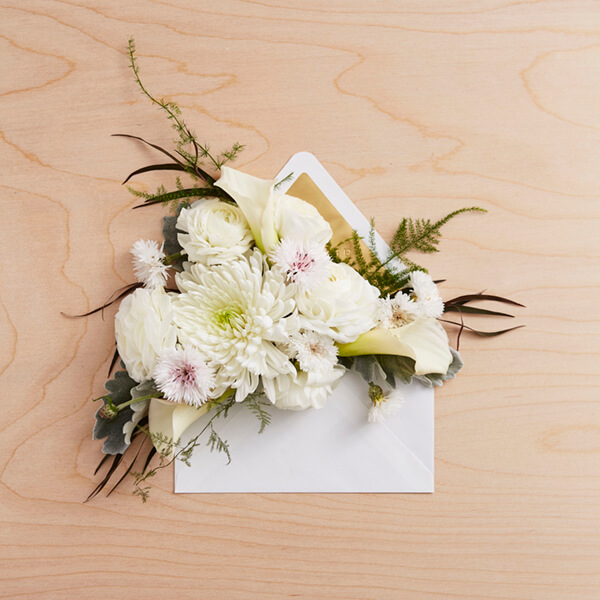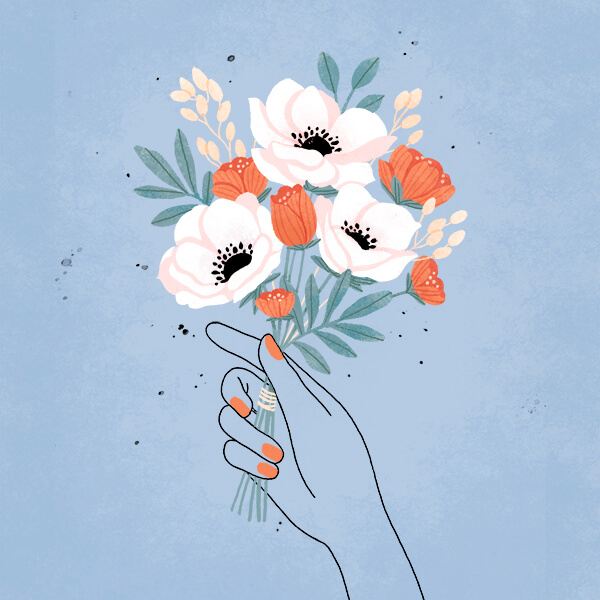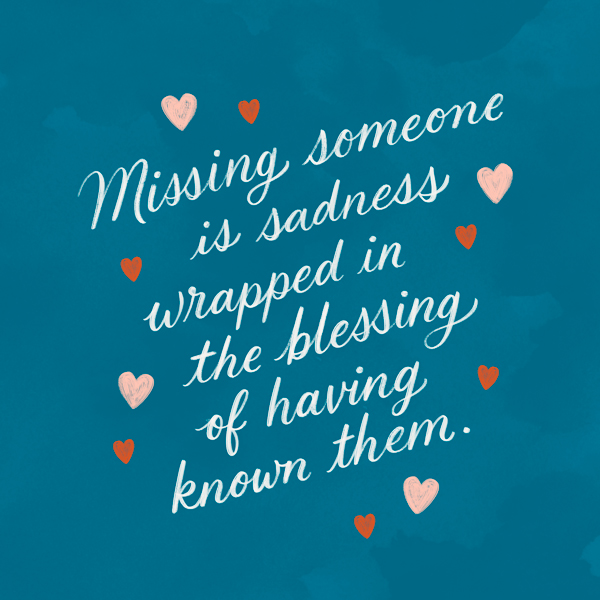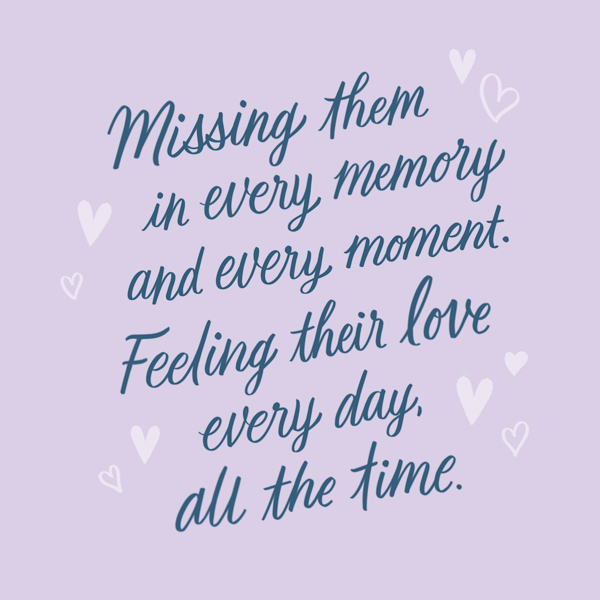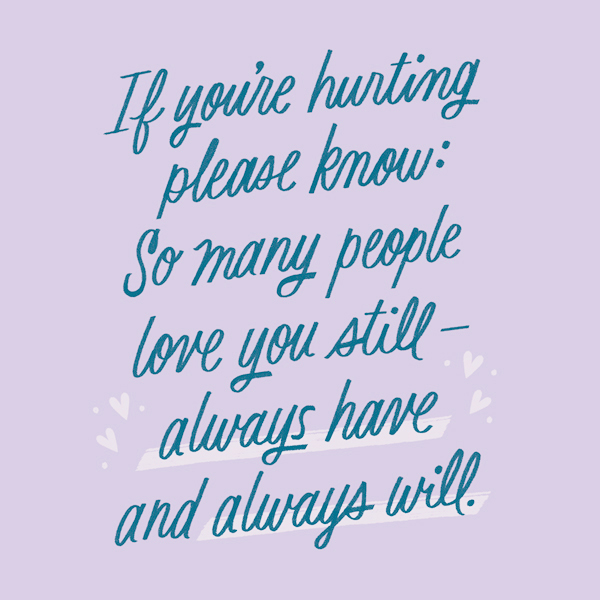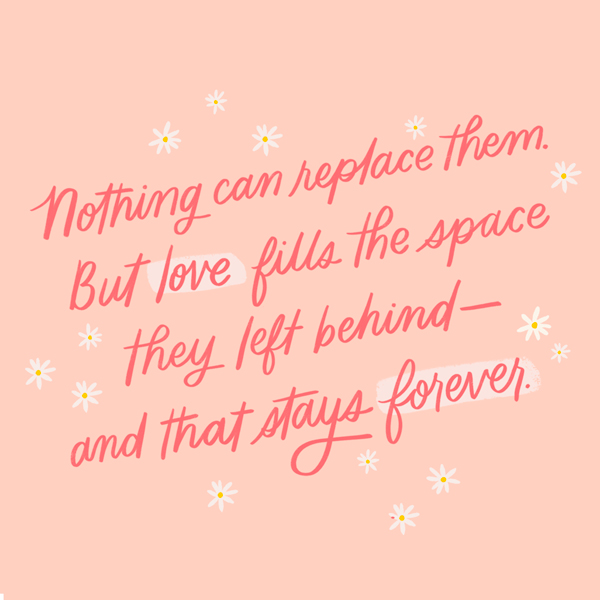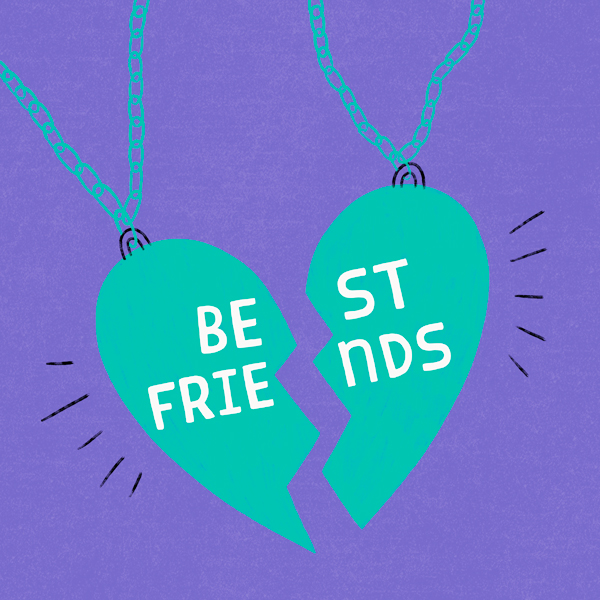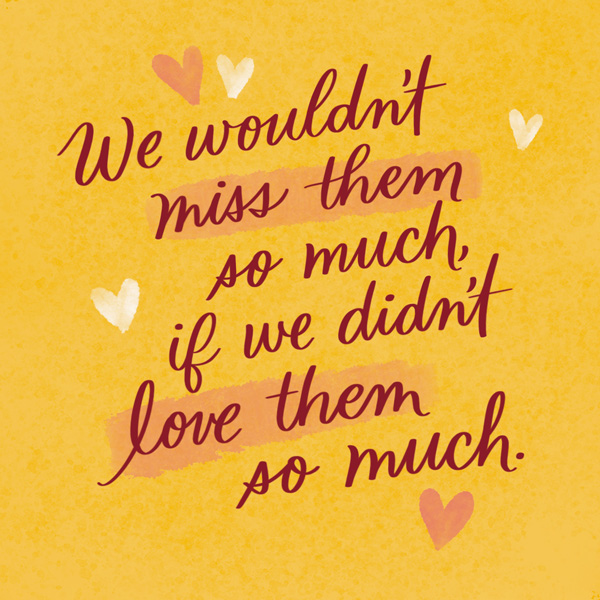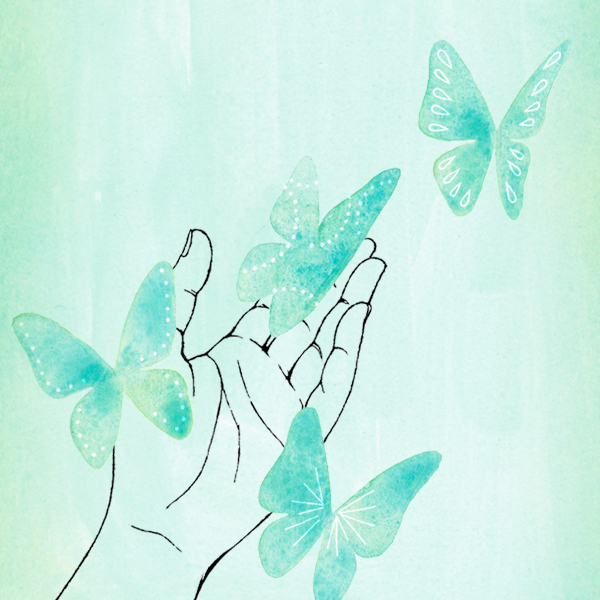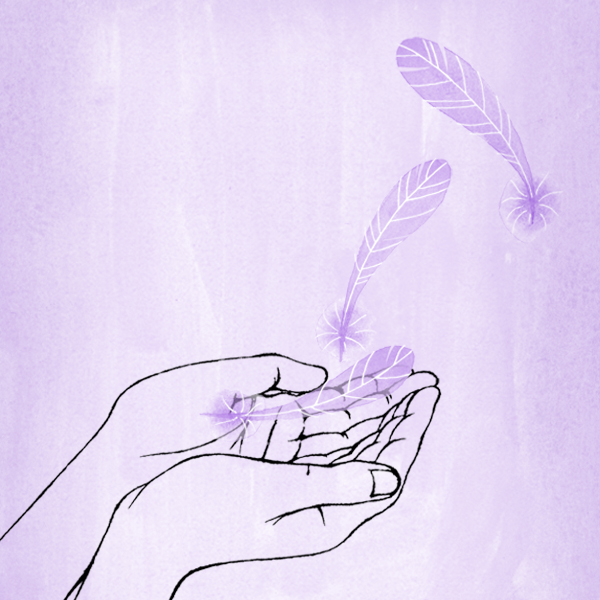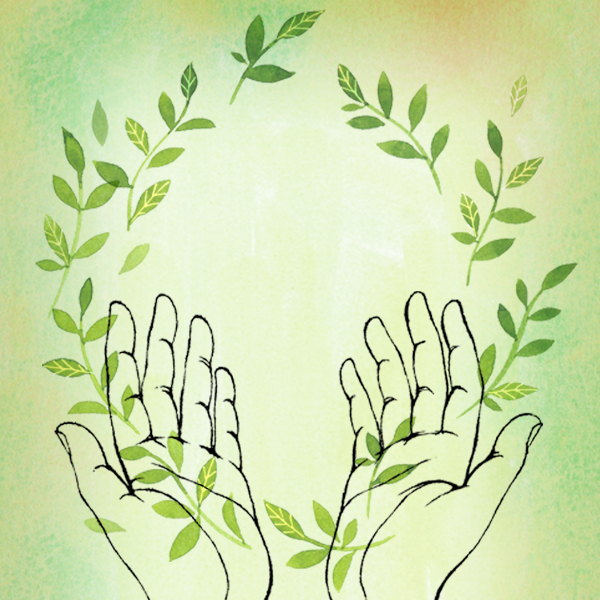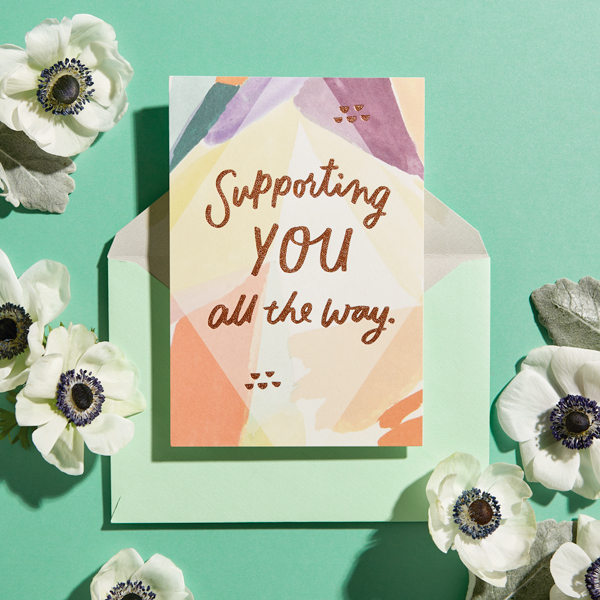How to support a grieving friend

“I was only 19 when I suddenly had to grapple with grief, not just for myself but for my whole family. I’m still learning every day how to deal with grief and find moments of joy when it comes to grieving those I’ve lost. I think it’s important to talk about grief, because grief can feel so lonely and private, but it doesn’t have to be.” –Abby J.
Death is a fact of life, which makes grief unavoidable. But we don’t seem to talk about it very much, which makes knowing what to say and do to support someone grieving a loss more difficult. Also, no two people grieve in the exact same way, adding to the challenge of helping a friend through their journey.
We spoke to some people about their grief experiences, and in sharing their stories, we hope you’ll find some good ideas on how to support a grieving friend and how to comfort someone you care about.
Inspired? Create and share by tagging @HallmarkStores.
What to do to support someone who’s grieving
“It’s the support that continues on, day after day, month after month, year after year, that really makes a difference for someone coping with loss…the cards, calls and hugs that keep coming that mean more than anything.” –Skyler H.
- It’s wonderful to send a sympathy card or other message of condolences after someone you care about loses someone they love, but grief is enduring. Checking in over time—months, even years later—brings much-needed comfort and even happy memories.
“After my husband died, when I’d ask my daughter if my 8-year-old grandson could come hang out with me, she’d always say yes. We had a cabin in TN that needed lots of work, so I’d make frequent trips to work on it. It was my ‘healing place’ of sorts.” –Rinda H.
- Activities that a person enjoys or that help them focus on other things besides their loss can be a particularly welcome diversion, and having someone they care about join them is often all the better. Whether that’s a family member or a friend, the human connection is important.
“One friend started bringing me some dinners, knowing what a relief a night off from cooking was. Another friend texted me to ‘Please put a cooler on your porch next week. We will be supplying dinner every night.’” –Mo S.
- When someone’s grieving, a lot of practical things can help. Specific needs will vary, but things like meal trains, babysitting younger children for a time or helping to clean their house make a big difference and are a concrete way to show you care.
“The death of a pet is also devastating and should never be disregarded. I felt like people were less likely to listen to my feelings because it didn’t involve a human, but I was hurting so deeply inside for months.” –Sunny H.
- Remember that each person’s loss is very personal and therefore no less meaningful. Never minimize someone’s grief, and try to read the signs to know how they’re feeling and respond with empathy.
What to say to support someone who’s grieving
“Some people may be nervous to ask a grieving person directly about their loved one, but I wanted to talk. I wanted to process my feelings and share my love for her, and the friends who gave me the space to do that with them were great.” –Jake G.
- Not everyone wants to talk about their loved one during their grieving (and they’ll likely let you know) but many do. It can help them work through their emotions and even relive happy memories that can be a light in a dark time.
“The best thing for me when my dad passed was hearing from other people who had also lost their fathers. Friends who reached out who had lost a parent made me feel less alone and also showed me that I would survive what felt like crushing grief. Having a community who gets it is so important.” –Abby J.
- If you have a similar story and can relate, it’s more than OK to say so. Just make sure you’re giving the other person the room in the conversation to share their experience.
“When you can’t say good-bye, you’re left wondering if there was something you left unsaid or some acts of affection you neglected to perform. It can feel devastating.” –Jake G.
- With a loss, especially an unexpected loss, the person grieving may worry they didn’t give their best to their loved one. If it feels authentic, it can be comforting to assure them they did.
Shop Sympathy
See allYou may also like
See more-
Sympathy Sympathy messages: What to write in a sympathy card
Signing a sympathy card isn’t easy. We search for words. We wonder what would be comforting to hear. We worry about s...
-
Mother's Day When Mother’s Day is hard: Grieving on Mother's Day
Find a few ways to offer support and kindness when Mother's Day is hard.
-
Sympathy Sympathy gift ideas for offering your condolences and support
Many times, we don’t know what to say after a loss. It can be difficult to determine what will comfort a hurting frie...
-
Sympathy 75+ grief quotes to give you comfort and help you heal
Grieving the loss of a loved one feels different for everyone, and there’s no telling what will bring comfort on a ha...
-
Valentine's Day Ways to find comfort and hope when you’re grieving on Valentine’s Day (or support someone who is)
Grief is always hard, but especially on Valentine’s Day. From social media to stores to kids’ classrooms, it can feel...
-
Valentine's Day How to survive Valentine’s Day after a divorce or breakup
We know that ending a relationship can be extremely heartbreaking. It’s a very significant loss, and when Valentine’s...
-
Mother's Day Mother's Day without Mom: Remembering lost loved ones with new traditions
This Mother’s Day will be my third without my mom. She died just before Thanksgiving and Christmas in 2020, which mad...
-
Lifestyle How to write an obituary: What to say about the life of a loved one
Summarizing a loved one’s life can feel like an impossible task, especially when you’re grieving. It’s even more chal...
-
Card Ideas What to Say When Someone Loses a Pet
My first cat died when I was 8 years old. His name was Barnabus—after the soap opera vampire—and he was a handsome bl...
-
Friends How to survive a friendship breakup
There are a few things that I dreamed of having more than anything as a kid—like a golden retriever, my own room, mer...
-
Christmas A Christmas tribute: meaningful ways to weave memories of lost loved ones into new holiday traditions
For many of us, Christmas is the time of year when we miss our lost loved ones the most. Finding ways to memoriali...
-
Sympathy Grief and the holidays: Supporting friends through difficult days
Many of our favorite holiday memories include family members and our closest friends. So it’s no surprise that people...
-
Baby What to Say When a Friend Loses a Baby: Messages of Love and Support
Losing a baby, no matter how it happens—or how early in the pregnancy—is devastating. It’s a time of sadness when ...
-
Sympathy Grief support: How to help someone who is grieving immediately after a loss
When a friend suffers the loss of a loved one, their whole life changes. And we wonder: What can we do to help som...
-
Sympathy Continuing grief support: How to help someone who is grieving over time
Grief doesn’t follow a schedule. There’s no deadline for the feelings of sadness, anger and loneliness to subside ...
-
Sympathy Grief support on anniversaries, birthdays and special occasions
When you’re supporting a friend through their grief, look to the calendar for cues about when they might need extr...
-
Sympathy Hospice Messages: What to Write to Someone Who is Dying
The end of a person’s life is an important time for friends and family members to reach out with words of caring, ...
-
Sympathy Grief and loss: how to comfort the grieving
The sympathy cards have been safely tucked away. The flowers have been careful...

